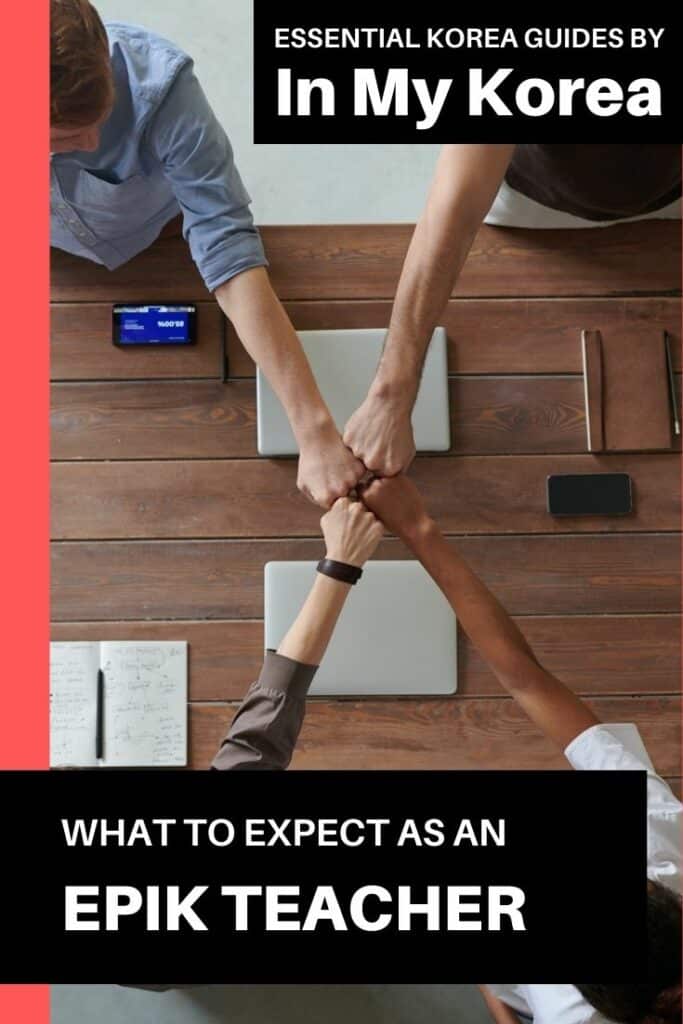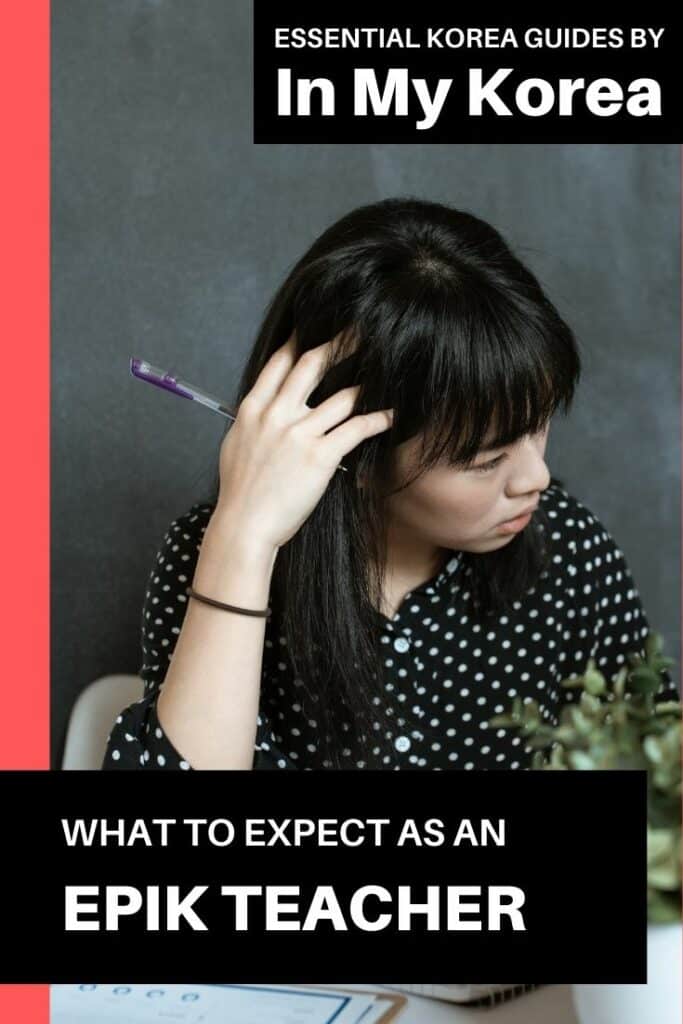Are you ready to embark on an adventure of learning, experience, development, and self discovery? Want to know what to expect and how your life could change through an EPIK teaching experience? Not sure if EPIK is right for you? Then this article has you covered with a comprehensive review of the highs and lows of the EPIK experience.
Whether you’re planning on moving to live and work in Korea with the EPIK Program, or you’ve just got off the plane at Incheon Airport, you’re probably not going to know exactly what to expect from a life with EPIK. What will the students be like? How will you get on with the teachers? What’s so great about the EPIK life?
In this guide to the EPIK experience I want to show you the sort of duties you might have, a day in the life of an EPIK teacher, and some of the great benefits (and challenges) of joining EPIK. There’s a lot to weigh up, but I’ve tried to give a balance of both the good and bad of the average EPIK teaching experience.
Affiliate Disclaimer: This site contains affiliate links and I may earn commission for purchases made after clicking these links.
What’s In This EPIK Teaching Experience Review?

To help you understand what an EPIK teaching experience might be like, I’ve broken down the life of an EPIK teacher into the following four areas:
- The work you’ll do
- People you’ll work with
- EPIK teaching benefits
- EPIK teaching problems
Firstly, I should point out a truth that I learnt from teaching English in another country, Japan. That is that ESID – Every Situation Is Different. What I will explain in this guide are possibilities – they might happen, but they might not.
There is no guarantee what your EPIK teaching experience will be like. The life of an inner-city high school EPIK teacher is worlds away from a countryside EPIK teacher who visits 4 different elementary schools.
However, there are some general truths that I’ve noticed from my 5 years working on EPIK, countless hours of conversations with my other EPIK friends, from annual training seminars, and my ongoing contact with the world of EPIK.
To begin, here’s a quick overview of the EPIK Program and who is eligible to join.
Quick Overview Of The EPIK Program

The EPIK (English Program In Korea) Program was created in 1995 as a way to increase the English-speaking abilities of Korean students and teachers, as well as to develop cultural exchanges between Korea and the English-speaking world. It’s grown a lot and made Korea one of the Best Countries To Teach English.
Today, the EPIK Program has thousands of foreigners from seven native English-speaking countries teaching English in schools across Korea.
Teaching English with EPIK is a win-win situation for both the Korean students and for citizens from the eligible countries. The students get to listen to and interact with a native English speaker. The native English speaker gets to experience life in Korea, develop skills through working in Korea, and has the chance to save and travel lots.
Who Is Eligible To Work On EPIK?
To be eligible for an EPIK teaching experience, you must be a native English speaker from one of these seven countries:
- United States
- United Kingdom
- South Africa
- Australia
- New Zealand
- Canada
- Ireland
Applications to EPIK must also hold an education-based Bachelor’s degree or any other Bachelor’s degree plus a 100+ hour TEFL certificate / teaching license.
When Can I Apply To EPIK?
There are two intakes where you can start you EPIK teaching experience – one in spring (late February), one in autumn (late August). The whole EPIK application takes up to 6 months, so you should definitely plan ahead for when you want to start.
If you are interested in applying for EPIK and want some advice about the application process and how to complete each step, check out this article:
Planning to visit Korea? These travel essentials will help you plan your trip, get the best deals, and save you time and money before and during your Korean adventure.
Visas & K-ETA: Some travellers to Korea need a Tourist Visa, but most can travel with a Korean Electronic Travel Authorisation (K-ETA). Currently 22 Countries don’t need either one.
How To Stay Connected: Pre-order a Korean Sim Card or a WiFi Router to collect on-arrival at Incheon Airport (desks open 24-hours). Alternatively, download a Korean eSIM for you travels.
Where To Stay: For Seoul, I recommend Myeongdong (convenient), Hongdae (cool culture) or Gangnam (shopping). For Busan, Haeundae (Beach) or Seomyeon (Downtown).
Incheon Airport To Seoul: Take the Airport Express (AREX) to Seoul Station or a Limo Bus across Seoul. Book an Incheon Airport Private Transfer and relax to or from the airport.
Korean Tour Operators: Tour companies that have a big presence in Korea include Klook, Trazy, Viator, and Get Your Guide. These sites offer discounted entry tickets for top attractions.
Seoul City Passes: Visit Seoul’s top attractions for free with a Discover Seoul Pass or Go City Seoul Pass. These passes are great for families and couples visiting Seoul – you can save lots.
How To Get Around: For public transport, grab a T-Money Card. Save money on Korea’s high speed trains with a Korea Rail Pass. To see more of Korea, there are many Rental Car Options.
Travel Money: Use money exchanges near Myeongdong and Hongdae subway stations for the best exchange rates. Order a Wise Card or WOWPASS to pay by card across Korea.
Flights To Korea: I use flight comparison sites such as Expedia and Skyscanner to find the best flights to Korea from any country. Air Asia is a good option for budget flights from Asia.
How To Learn Korean: The language course from 90 Day Korean or Korean Class 101 both have well-structured lessons and lots of useful resources to help you learn Korean.
What Do I Do As An EPIK Teacher?

The heart of your EPIK teaching experience will be just that – teaching. That’s what you’ve been hired to do and your ‘competitive edge’ over Korean English teachers, whether right or wrong, is your ability to speak English as a native teacher.
As a native English speaker, you’ll be expected to focus more on speaking and listening skills in the classroom. Students get plenty of chances to read and write in English, but not so much listening and speaking practice, especially not with a native speaker.
You’ll be expected to focus more on speaking and listening skills in the classroom.
When placed on EPIK, you’ll be assigned an elementary school (most likely), a middle school, or a high school (least likely). You might get more than one school. There are also a few special institutions where some people will be placed (like I was), however, those are quite rare. Each of these locations will provide a very different EPIK teaching experience.
To help illustrate what a day in the life of an EPIK teacher might look like, it’s best to first understand the responsibilities of an EPIK teacher and what you might be expected to do.
Responsibilities Of An Epik Teacher
The official responsibilities of an EPIK teacher are as follows:
- Assist Korean teachers with their English class
- Jointly conduct English classes with Korean teachers
- Teach 22 hours per week
- Prepare extracurricular activities or English camps
- Conduct English conversation classes for Korean students and teachers
- Prepare teaching materials for English language education
- Assist in development of teaching materials
- Assist with activities related to English language education
- Other duties as specified by your MOE/POE*
*Metropolitan Office of Education / Provincial Office of Education
Let’s clarify a few of those key responsibilities so you can really know what to expect from your EPIK teaching experience. I’ll cover what I deem to be ‘additional duties’ later on.
Teaching English classes with Korean teachers
Firstly, the core part of your work will be teaching English classes ‘with’ Korean teachers. I say ‘with’, because sometimes you’ll be teaching together, sometimes the Korean teacher will lead, sometimes you’ll lead, other times the co-teacher might be observing from the back of the classroom. Sometimes they might not even be there, however, this is not meant to occur.
Prepare teaching materials for English language education
As for materials development, it’s quite common for EPIK teachers to be responsible for the ‘fun’ aspect of English education. What I mean by that is that they’ll use games to practice grammar or vocabulary with the students, whilst the Korean teacher covers the understanding side of learning (usually through translation).
Prepare winter & summer camps
The Korean school breaks for winter and summer are quite long and the only time you can really use your holiday allowance.You’ll also be expected to teach week-long English camps at your school to provide additional English education for students who wish it.
The English camps are generally not as rigid as a usual English class and you can introduce themes (e.g Harry Potter / cooking / space exploration), which help make it a lot more interesting. They can be tough as you need to plan for several days of activities, but also a great chance to bond with a few students.
Teach 22 hours per week
You will teach up to 22 ‘hours’ per week. These teaching ‘hours’ are not actual hours, but counted as periods of teaching. For example, a 40 minute class will count as 1 ‘hour’ of teaching. So you’ll teach up to 22 English lessons per week.
The exact number of hours can vary each week, depending on other school events or school closure (holidays). Lessons during English camps or special classes may be longer.
Additional Duties For An EPIK Teacher
Additional duties that you could be expected to fulfil as an EPIK teacher are as follows:
- Afternoon English club / classes
- Speech contest training
- Marking (usually MS / HS)
- Conversation practice with students / teachers
- Other duties as specified by your MOE/POE
You might be asked to provide afternoon classes in the afternoon (within your work hours). These are often classes where you can play games and chat with the students in a more relaxed environment.
As for the other additional responsibilities, you may never have to do them. You may do them every week. You might be asked to judge a speech contest or give a talk about English education or your home country. ESID, sorry.
The ‘other duties as specified by your MOE/POE‘ really can be anything and it’s honestly an unfair line to have written into your contract because it is ridiculously vague.
Now, let’s see what a typical day is like for an EPIK teacher.
A Typical Day As An EPIK Teacher

A typical EPIK teaching experience at elementary school (where most EPIK teachers work) would start with a busy morning and then a quieter time after lunch. Teachers are expected to work 8 hours from around 8:30 am to 4:30 pm. The actual times can vary depending on the school.
EPIK teachers often teach 4 morning classes five times a week (20 classes) and the occasional afternoon class. Lunch is around noon and you might eat with the teachers in the teachers office, or with the students if the school does this. In the afternoon you might teach classes, but mostly you’ll be allowed to use this time for class preparation.
You can get closer to the students, help them practice English, and develop a bond with them.
There may be some club activities that you are asked (or can volunteer) to join, such as volleyball club, English club, or clubs for other subjects. These classes can be one of the best parts of the EPIK teaching experience as you get to spend some time with the students in a relaxed environment.
You can get closer to the students, help them practice English, and develop a bond with them. This certainly goes a long way to making classes easier for you as the students have a greater connection to you, improving their motivation to learn.
At 4:30 pm, you’re free to go home and enjoy the wonders of life that come from finishing so early. Much better than a 9-6 office job with a long commute home! If you finish all your class preparation in the afternoon, you’re free to enjoy the evening.
The People You’ll Meet With EPIK

During your time teaching English with EPIK, there are three main groups of people you’ll interact with on a regular basis. These are:
- The students you teach
- The teachers at your school
- Other EPIK teachers in your area
These different groups will all massively impact on your EPIK teaching experience in Korea and can change whether you leave EPIK with happy memories and smiles, or trudging off back home with a bunch of regrets and negativity.
Whole books could be written about each of these three groups, but I’ll try to quickly outline some key factors about how they’ll affect your experience with EPIK and how to better get along with them.
Your Students & Your EPIK Teaching Experience
The draw of living in another country for a lot of people is the chance to experience new places, try authentic dishes, meet new people, and travel further afield.
When you start working on EPIK, you quickly learn that the interactions, random hilarity, and uniqueness that students bring to your life is just as intoxicating as all that other stuff.
Every EPIK teacher leaves with a collection of extraordinary stories that happened whilst they were teaching or interacting with students. Often these stories are the ones that you want to tell more than the time you tried some delicious dish or saw a famous sight.
That one time this student said something hilarious in the middle of the class, when that one kid tried to high five you and broke your glasses instead, when you met a bunch of your students in town and they start screaming and waving at you, when your students draw funny pictures of you on the whiteboard, etc., etc.
You quickly learn that the interactions, random hilarity, and uniqueness that students bring to your life is… intoxicating
However, students can also make your life really tough if you don’t spend the time and effort to forge a bond with them and earn a tiny bit of respect. Taking discipline and authority too seriously is a quick way to ruin any chances of getting them to like or respect you. They’re children, after all. They are often fickle beings.
Seriously though, your relationship with the students is key to creating a positive EPIK experience and the difference between waking up and being excited to teach this new activity you’ve devised, or dragging yourself out of bed and dreading the thought of teaching Class 2 first thing in the morning.
Sometimes there’s nothing you can do about some of the students, you don’t see them enough to form much of a bond, or they have issues that you have no idea about that makes them act out. In these situations, there’s not much you can do but try your best to be patient, kind, and more than a bit silly.
The students are the core of your EPIK life, but there is another group that can make life on EPIK just as good or bad – the other teachers.
Working With Korean Co-Teachers On EPIK

When you start working on EPIK, you’ll be made to do an online orientation (after your pre-EPIK orientation) which includes a lot of details about co-teacher relationships. You’ll be told about how to teach effectively with Korean English teachers and the idea that you should be flexible is hammered home quite hard.
Your English classes should involve both you and your co-teacher engaging the students, encouraging them to learn English in fun and creative ways, with both of your using your skills to fully maximise the learning experience. Sounds perfect, and if you have a good relationship with your co-teacher, that’s exactly how it can be.
The way you get on with your co-teachers influences your EPIK teaching experience in many ways.
Here are some reasons why it’s crucial to have a good relationship:
- To help you get along in and out of class
- Teaching as a pair can be more effective than teaching separately
- So you can develop materials together
- To be able to bounce ideas for lessons off each other
- You might end up being good friends outside of school
- Students are clever and can see it when teachers don’t get along
- Together Everyone Achieves More (TEAM)
There are a lot of benefits to having a good relationship with your co-teacher and other staff. Not only for what I mentioned above, but also because it’s generally not good to have a bad relationship with people you work with.
Your relationship with your co-teachers (and other school staff) is a lot more important that your relationship with the students if you want to work on EPIK for longer than one year. They are the ones who have an unfair (in my opinion) amount of say over whether or not you’ll be re-contracted.
The best way to have a good relationship with your co-teachers is to be patient, don’t put them in awkward situations, and don’t give up.
Sounds like it should be easy, right? Not as easy as it should be. Here’s a few reasons why you might have troubles with other teachers:
- Your co-teacher is too busy to spend time being sociable
- They may be too unsure of their own language abilities
- You don’t listen to their ideas and expect them to follow yours
- There are countless unspoken cultural rules that you keep breaking
- The last EPIK teacher made a really bad impression
- You’re just simply very different people
You might have several co-teachers in your school(s) and have a very different relationship with each one. I had some that were amazing and we went out for coffee together. Others had no time (or desire) to chat and didn’t like speaking English. ESID again.
The best way to have a good relationship with your co-teachers is to be patient, remember that they’re a lot more qualified than you are, don’t put them in awkward situations (big no-no in Korea), and don’t give up. Talk to them and try to understand where the breakdown has occurred.
If all else fails, take them out for chicken and soju and bond over drunken revelry. It’s the Korean way to build good work relationships.
If you want to understand some of those cultural rules, and how to avoid breaking them, check out this article about Understanding Korean Culture & Etiquette.
The last two in the list are sadly not really anything you can deal with. When you find yourself in a bad (or good) situation, that’s when you really need the third group of people.
Other EPIK Teachers: Your Personal Support Group

Living far away from your home country and being an expat is not always a walk in the park. There are days in your EPIK experience when you want to scream, shout, and eat ice cream in front of the TV. It’s on those days that you need to chat with other EPIK teachers – your EPIK support group.
The EPIK teachers you meet during your orientation and in your new city are the ones you’ll usually form the closest bond with. You’ll go through the highs of culture shock together (wow, look at this!), and the lows (I miss my family).
These people can best understand why you’re having a tough situation and can help you let off steam after a hard day. And it’s important to remember that they’re probably going through the same thing, so be sure to listen when someone starts to complain about life.
Hopefully there are many more good days than bad, and you generally have an extremely positive EPIK teaching experience, but there will be times when stuff just goes wrong and that’s when you need your friends.
Your EPIK friends will be there to share meals, travel and explore, and chat about the latest K-pop album, or that funny thing your student did in class the other day
Remember, there is a fine line between letting off steam and turning into a constantly complaining wretch who hates their job and wants to do something else. If you’ve found that you’re complaining more than telling funny stories about what happened in class, you might want to take a moment to reflect on your situation.
Beyond the need to support each other, your EPIK friends will be there to share meals, travel and explore, and chat about the latest K-pop album, or that funny thing your student did in class the other day.
In the first year, a lot of EPIK teachers stick to the other teachers they met during orientation or in their immediate area. Later on, if you decide to stay in Korea, you tend to break into smaller groups as people leave EPIK or have different friends.
Some friends stick with you (I still have some friends from EPIK after 5+ years) and you’ll make loads of new friends – both Korean and in the expat community. You might even end up in a serious relationship and settle down in Korea. Whatever you do, be sure to trust and rely on your friends to help you make the most of your time in Korea.
If you want to know what it’s like living as an expat in Korea, check out my own articles about expat life in Korea and with EPIK.
My EPIK Life: My personal experiences during 5 years teaching with EPIK.
Living In Korea As An Expat: What’s life like living in Korea as an expat? Find out the highs and lows.
In the next two sections, I want to offer a few insights into the highs and lows of the EPIK teaching experience. You’ll certainly experience both if you start working on EPIK, but I think there’ll definitely be a lot more highs than lows.
The Benefits Of Being An EPIK Teacher

Whether you’re looking for an escape from your ‘regular’ life, a chance to explore a unique culture, a fresh start in a new country, or the chance to save a boatload of money, there’s many awesome things about the EPIK teaching experience.
The key benefits you can get from being an EPIK teacher generally fall into one of these categories.
Your EPIK Contract
Whilst your base pay (~2,000,000 KRW and up) doesn’t seem that high compared to salaries in other countries, your disposable income can be higher than you’d have at home. You get a free apartment, healthcare is cheap and EPIK pays 50% of that (same with pension), you’re often living near your school so transport costs are low, and life in Korea is generally cheap.
Not only that, you’ll receive 1 month’s salary at the end of each year you teach in Korea, a 2,000.000 KRW bonus for re-contracting, flight allowance into and out of Korea, and a generous number of days off (between 18~26 days plus public holidays).
You Can Save Lots Of Money
As mentioned, your disposable income is quite high and you get a number of bonuses for re-contracting and when you end your EPIK teaching experience. This all adds up to the chance to save a lot of money. You could quite easily save up to $10,000 a year by saving carefully.
The amount you save depends a lot on your lifestyle and how much non-Korean stuff you eat or drink, as well as how much you travel. I was able to save a lot of money during my 5 year EPIK experience and the longer you live in Korea, the more you can save.
Although I’d always recommend EPIK for a lot more than just the money, it honestly can be a great way to help pay down student debts, save for a house, or to fund your backpacking dreams for 6 months or more. I know plenty of EPIK teachers who have saved a lot for these.
Your Daily EPIK Lifestyle
The chance to finish work before 4:30pm each day is great. It gives you a lot of extra time to join clubs, cook at home, and spend time drinking soju with friends. You’ll only be teaching 22 hours (classes) per week, and you don’t have to take your work home with you if you can prep in the afternoon.
You also get to meet some amazing people – both students and teachers. The fun and originality that working with children can bring to your daily life is so much better than sitting in an office staring at a computer. Sure, there are days when you have to deal with one of them vomiting on your desk, starting a fight, or crying randomly, but it’s usually much better than it is worse.
There are also random events such as fire-safety day (get to put out a fire), sports festivals (cheer for your favourite students), cultural events, and so much more that make everyday EPIK life enjoyable. I got to dress up in a hazmat suit during a nuclear war drill!
Living In A Different Culture
Joining EPIK is a lot more than teaching and saving money. You have the incredible opportunity to experience living in a completely different culture, with a new language, people, and way of doing things. This can blow your mind.
You’ll notice not only the cosmetic differences, but deeper cultural disparities between the way you are used to doing things and the way they’re done in Korea. Whilst some may be bothered by these, it’s a chance for you to learn, develop, and broaden your own outlook on life and culture.
Living overseas challenges you in ways you might never think about. Working out how to communicate when you don’t speak the local language. Being brave enough to try that dish of wriggling octopus legs. Figuring out how the toilets work. There are countless opportunities for personal growth during your EPIK teaching experience.
These opportunities can also be challenges for some people. How you look at them, and react, depends on the kind of person you are. Before reading the next section, I want to say that these challenges can be overcome and if you’re willing to adapt, they can become opportunities again.
The Challenges Of Being An EPIK Teacher

If you’re an eternal optimist (as I try to be), you’ll see these not as ‘problems’, but as temporary road bumps in your path to creating the perfect EPIK experience for yourself.
I’m not going to lie and say these things are easy to overcome, they’re not, and some will leave you crying in the shower with a tub of ice cream. Some aren’t particularly fair, others you might not even realise are happening (especially true with culture shock), but they’re all part of life as an EPIK teacher.
Of course, you may never experience most of these, which is awesome. I hope you don’t. I want to cover them because they can exist, and I think it’s only fair to show both sides of the EPIK teaching experience.
I won’t go into as much detail as with the downsides as… ESID. And also I prefer not to dwell on negatives.
Here’s some of the things that can test you on EPIK.
- You struggle to adapt to life in Korea
- You just don’t get the cultural differences
- Language and communication problems
- Your co-teacher is unkind to you
- That one student (or more) that makes your life hell
- You’re placed in the middle of nowhere
- Your school situation is uncomfortable
- The food can be notoriously spicy / salty
- Air pollution and allergies
- Summer (too hot, bugs) and winter (too cold, dry)
I’d break the above list up into three different categories.
Things You Can Prepare For
The first 3 items are things you can plan for before and learn about before you move to Korea. Learn to speak Korean, try to understand cultural differences, and be prepared for the ‘Korean surprise’. These problems should disappear or be reduced over time.
Things That Require Perseverance
The next 3 you might think are beyond control, but you can still influence them with a lot of work. Do your best to build bridges with your co-teachers and students and accept your situation for what it is. Relationships take time and energy.
Whilst life in the countryside might seem like a death sentence for some, it’s also an opportunity to see a more authentic, generous side of Korean culture. And you have the weekends to travel to Seoul and other cities.
Things Outside Your Control
The final 4 are beyond your control, but you can learn to live with them. If your school life is uncomfortable because someone doesn’t like foreigners, or the principal is harsh, or something else, then sometimes the only option is to suck it up and focus on the positives. Not easy, but better than letting it get you down.
Korean food isn’t for everyone, and spicy food isn’t something you can train your body for overnight. Learn what you can and can’t eat and try to create a diet that’s good for you.
Summer is morbidly hot and wet whilst Korean winters are the polar opposite, and indeed like being at the North Pole – really cold and dry. It can get as low as -20 in winter and above 40 in the summer. As for air pollution and allergies… good luck!
Still not sure about whether or not you want your own EPIK teaching experience? Then I’ll try to offer some final advice for you.
Would I Recommend You Join EPIK?

Yes, I’d definitely recommend an EPIK teaching experience to others. Whether you’re coming out of university, or sitting in an office job wondering what you’re doing with your life and craving a change, EPIK is a great opportunity to try something new.
You don’t have to be ‘young’ to do it either. There are plenty of other teachers in Korea who are in their 30s, and more who are working at universities, high schools, and other institutions in their 40s and beyond. Make new friends, learn about a new culture and language, experience life as an expat, and maybe even discover a new career.
The cost of living in Korea is reasonable (unless you live in Seoul or have a big family), you can save a lot of money in a year, even more in 5 years. A lot of people come to Korea and leave with significant savings that they use to pay back student loans, travel, put down as a deposit on their house, or for a rainy day in the future.
Of course, there are many other reasons to try the EPIK life, including the chance to make new friends, learn about a new culture and language, experience life as an expat, and maybe even discover a new career. Everyone has their own reason for starting the EPIK life, and each person has their own situation. Remember, ESID – Every Situation Is Different.
If you’d like to apply for EPIK, you can find out how in this article about How To Apply For EPIK.
EPIK Teaching Experience FAQs
Finally, here’s a few FAQs about the EPIK teaching experience, in case you’re interested in trying it out for yourself.
Is teaching in Korea with EPIK easy?
That depends a lot on your own level of confidence and ability. Some people will find it easy to adapt to life in Korea and may already know some Korean, which certainly makes life a lot easier. Some people may be confident public speakers and have teaching skills. Those ‘skills’ are varied and can, for example, include being able to laugh at yourself and tolerate awkward questions from students.
How much can I earn teaching with EPIK?
Starting salaries on EPIK range from 2,000,000 KRW to 2,500,000 per month. This depends on your level of experience and qualifications, as well as the area you’re placed in. Countryside placements earn more than metropolitan areas and EPIK teachers working at multiple schools earn an extra 100,000 KRW per month. EPIK also pays overtime for hours taught (not worked) over the contracted 22 teaching hours. There are many other benefits, such as severance pay, renewal bonuses, flight allowance, and health & pension contributions.
What is the best thing about the EPIK teaching experience?
For most EPIK teachers, the best part of the EPIK teaching experience comes from teaching Korean students and experiencing life in Korea as an expat. Other EPIK teachers also value the ability to save up a good sum of money during their EPIK teaching experience.
How can I apply to EPIK?
You can apply for EPIK in 3 ways – directly to the EPIK Office in Korea, through a recruiting agency, or a MOU/MOA Organisation in your country. There is no direct advantage of one method over the others, however, applying directly to the EPIK Office can result in a faster process and placement confirmation.
Do I need teaching experience for EPIK?
No. You don’t require any teaching experience for EPIK. However, you will be eligible for a higher salary with teaching experience, increasing with the number of years you’ve been teaching. You will require at least a Bachelor’s degree and a teaching certificate or TEFL certificate.
Is an EPIK teaching experience fun?
Yes, however, that is a personal opinion. The EPIK Program has been running for decades with thousands of people from around the world successfully joining the program and many times more applying each year. Its ongoing success and popularity is a sign of the enjoyability of the EPIK experience.
How can I use my EPIK teaching experience?
Whether you want to continue teaching English in Korea or other countries, the knowledge and skills you gain through an EPIK teaching experience can be useful in many situations. These days employers value global experience and understanding of other cultures. Furthermore, teaching in Korea demonstrates an ability to manage time, be organised, prepare materials, work with others, and meet deadlines.
Liked This? Pin It For Others
If you enjoyed reading this article, then please share this with your friends on Pinterest.








